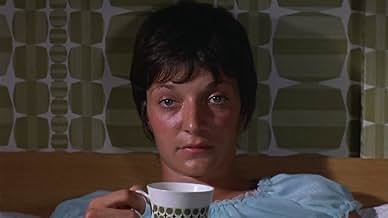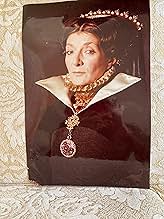Jane Lapotaire
- Actress
- Soundtrack
A much-acclaimed stage actress, she was born of French ancestry as Jane Elizabeth Marie Lapotaire in Ipswich, England. She had a troubled childhood. Abandoned by her mother at the age of six months and having never known her father, she was fostered by a woman she called Granny Grace (aka Grace Chisnell), who, in turn, had raised Lapotaire's (orphaned) French biological mother. Her mother reclaimed her when she was twelve, though Jane opted to remain with Grace. Both her mother and her partner, Lapotaire's de facto stepfather, disapproved of Jane's acting ambitions. Eventually accepted by the Bristol Old Vic Theatre School after failing an earlier audition at RADA, she studied acting from 1961 to 1963. As a member of the Old Vic Theatre Company, Lapotaire made her debut two years later as Ruby Birtle in J.B. Priestley's Victorian comedy When We Are Married. After seasons with the National Theatre under the direction of Laurence Olivier (1967-70), she helped to found the Young Vic Theatre in London where her classical repertoire encompassed Katharina in The Taming of the Shrew, Jocasta in Oedipus and Isabella in Measure for Measure. In 1974, she joined the Royal Shakespeare Company, portraying, among others, Rosalind in As You Like It, Viola in Twelfth Night and Lucy Honeychurch in A Room with a View. She later toured with the RSC in Henry VIII (as Katherine of Aragon). In a 2015 interview Lapotaire declared "Being a classical actor is a vocation - you don't do it to be famous or get rich. You do it because you love the language."
In 1978, she created her famous role as Édith Piaf which transferred from London theatres to Broadway in 1981 and won her a Best Actress Tony Award. Contemporary New York Times reviewer Frank Rich commented: "Miss Lapotaire's performance burns with such heart-stopping intensity that one never questions her right to stand in for the 'little sparrow'." In 1985, Lapotaire headlined opposite Anthony Quayle in the title role of Saint Joan at the York Theatre Royal. Returning to the RSC, she was Gertrude to Kenneth Branagh's Hamlet (1992-93), the Duchess of Gloucester in Richard II and Queen Isobel in Henry V.
Lapotaire's career on the screen, though largely subordinated to the stage, has seen her notably prominent in period drama and in adaptations of literary classics, from Antony and Cleopatra (1972) to Macbeth (1983), from Lady Jane (1986) to The Dark Angel (1989). She portrayed the influential and wealthy Duchess Eleanor of Aquitaine in The Devil's Crown (1978), Elizabeth Moulton-Barrett (later Barrett-Browning) in The Barretts of Wimpole Street (1982) and the Dowager Empress Dagmar of Russia in Edward the Seventh (1975). She starred (and was nominated for a TV BAFTA) as the titular Nobel Prize-winning pioneer scientist in the miniseries Marie Curie (1977). A more recent role saw her as the émigré Russian aristocrat Irina Kuragin in an episode of Downton Abbey (2010). Lapotaire also received a second BAFTA nomination for her role as a left-wing feminist barrister in the judiciary-themed miniseries Blind Justice (1988).
Jane Lapotaire has served as honorary president of the Bristol Old Vic Theatre Club. She has written several memoirs, including Grace and Favour (1989) and Everybody's Daughter, Nobody's Child (2007), both detailing the difficult years of her childhood. Another book, Time Out of Mind (2005), recounted her recovery from a cerebral hemorrhage in 2000.
In 1978, she created her famous role as Édith Piaf which transferred from London theatres to Broadway in 1981 and won her a Best Actress Tony Award. Contemporary New York Times reviewer Frank Rich commented: "Miss Lapotaire's performance burns with such heart-stopping intensity that one never questions her right to stand in for the 'little sparrow'." In 1985, Lapotaire headlined opposite Anthony Quayle in the title role of Saint Joan at the York Theatre Royal. Returning to the RSC, she was Gertrude to Kenneth Branagh's Hamlet (1992-93), the Duchess of Gloucester in Richard II and Queen Isobel in Henry V.
Lapotaire's career on the screen, though largely subordinated to the stage, has seen her notably prominent in period drama and in adaptations of literary classics, from Antony and Cleopatra (1972) to Macbeth (1983), from Lady Jane (1986) to The Dark Angel (1989). She portrayed the influential and wealthy Duchess Eleanor of Aquitaine in The Devil's Crown (1978), Elizabeth Moulton-Barrett (later Barrett-Browning) in The Barretts of Wimpole Street (1982) and the Dowager Empress Dagmar of Russia in Edward the Seventh (1975). She starred (and was nominated for a TV BAFTA) as the titular Nobel Prize-winning pioneer scientist in the miniseries Marie Curie (1977). A more recent role saw her as the émigré Russian aristocrat Irina Kuragin in an episode of Downton Abbey (2010). Lapotaire also received a second BAFTA nomination for her role as a left-wing feminist barrister in the judiciary-themed miniseries Blind Justice (1988).
Jane Lapotaire has served as honorary president of the Bristol Old Vic Theatre Club. She has written several memoirs, including Grace and Favour (1989) and Everybody's Daughter, Nobody's Child (2007), both detailing the difficult years of her childhood. Another book, Time Out of Mind (2005), recounted her recovery from a cerebral hemorrhage in 2000.































